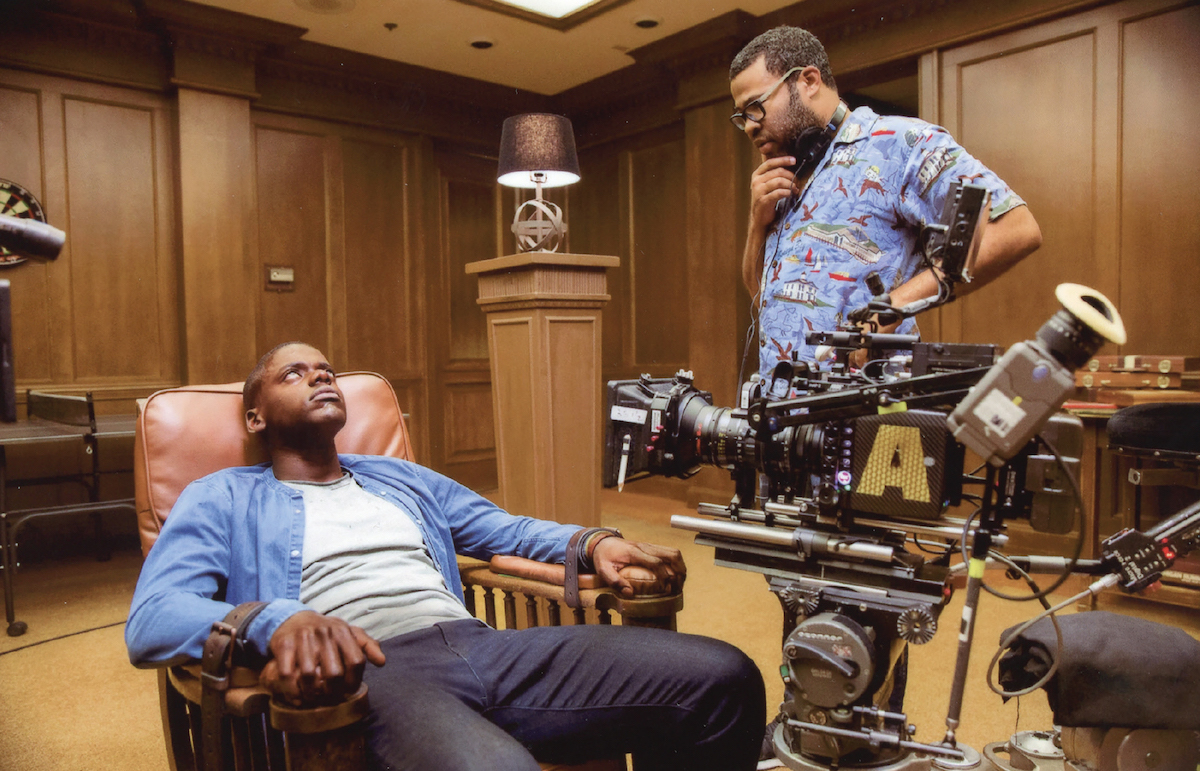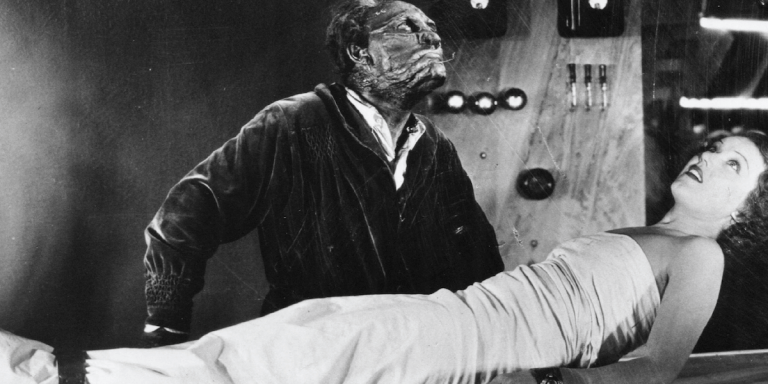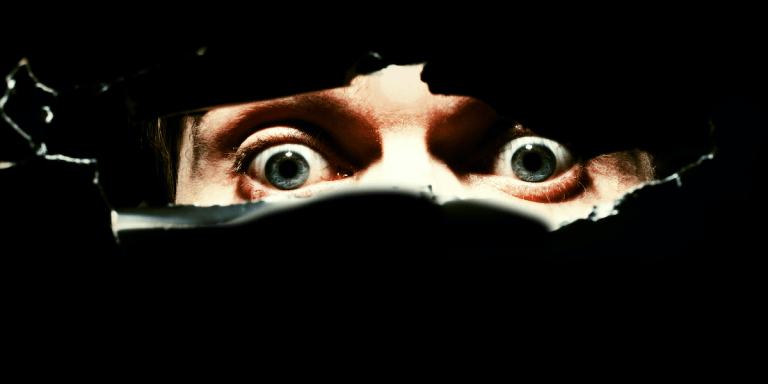The Horror Movie We Need: Get Out (2017)
FRIGHT FAVORITES: GET OUT
Guess who’s coming to dinner? Pod people, maybe.
Excerpted from FRIGHT FAVORITES: 31 Movies to Haunt Your Halloween and Beyond by David J. Skal. Copyright © 2020. Available from Running Press, an imprint of Hachette Book Group, Inc.

Jordan Peele, the comedian previously best known for his work on the Comedy Central sketch show Key and Peele, didn’t feel like he had to make a major adjustment when he turned his mind to making an independent horror film. Horror and comedy, he knew, were both highly structured genres, each involving careful pacing and closely calibrated “reveals.” Not to mention that laughing and screaming are both time-honored tension-relieving strategies, in art and in life.
In Get Out, Chris Washington (Daniel Kaluuya), a black photographer, agrees to spend a weekend with the family of his white girlfriend, Rose Armitage (Allison Williams), who are unaware that Rose’s relationship is interracial. Rose’s father, Dean (Bradley Whitford), is a neurosurgeon, and her mother, Missy (Catherine Keener), a hypnotherapist. They seem welcoming, but still they make very odd comments about race. Equally disconcerting to Chris is the strangely dazed behavior of the family’s black employees, Walter, who tends the grounds, and Georgina, who keeps the house.
Chris experiences insomnia, and Missy convinces him to participate in a hypnotherapy session, ostensibly to help him stop smoking. After revealing personal details unrelated to smoking during the trance, he is led by Missy to a psychological void she calls “the sunken place.” Although he remembers the session as a dream, in the morning he indeed has developed an aversion to cigarettes.
At the Armitages’ yearly estate party, held the same day, rich white people repeatedly compliment Chris on his physical condition and speak glowingly of black athletes like Tiger Woods. They tell him they would have backed a third term for Barack Obama. They stare at him with frozen smiles. He meets another strange black man, Logan King (Keith Stanfield), and sends a photo of Logan from his phone to his friend Rod Williams, a TSA agent, who is sure that the man’s real name is Andre Hayworth, a missing person and possible kidnapping victim.
Chris believes that there is much more to learn, and he begins to question Rose’s part in what seems to be a race-based conspiracy. Only when he is rendered helpless is he told the complete story of what, exactly, the Armitages expect of him.
It’s difficult to talk about Get Out without revealing its imaginative central premise or too much of its plot resolution, but let’s just say that Peele has constructed a devilish metaphorical device that makes the whole idea of “cultural appropriation” stunningly literal, as well as satirizing the uneasy mixture of condescension and cultural envy that has often informed the attitude of liberal white elites toward people of color. In particular, Peele zeros in on the widespread mythology of superior physical prowess among blacks, and how this might be exploitatively tapped for the benefit of aging whites.
Personality hijacking, replacement bodies, hypnotic mind control, and brainwashing are durable themes in science fiction and horror, and Peele’s film reflects the legacy influence of a number of works, including Invasion of the Body Snatchers (1956, 1978, 1993, and 2007 adaptations), The Thing, and The Stepford Wives. Peele has stated that The Stepford Wives was indeed a conscious template for Get Out’s gated, manicured suburbia. There’s also palpable influence from another Ira Levin book-turned-film. The fixed expressions of the guests at the Armitages’ garden party uncannily conjure the faces of the true-believing devil worshippers who gathered around Mia Farrow when she finally got a glimpse of her demon child in Rosemary’s Baby.
The initial reviews of Get Out were extraordinarily good, and so was word of mouth. As the British critic Frank Kermode, writing in the Observer, noted, “Beneath the beatific smile of twenty-first-century liberalism, Get Out finds the still grinning ghoulish skull of age-old servitude and exploitation unveiled during a rollercoaster ride into a very American nightmare.” Time called it “the horror movie we need today.” Get Out was an event film to talk about, not just go to see. The film’s $4.5 million investment yielded a worldwide gross of $255.5 million, an extraordinary ratio by any standard. It received four Academy Award nominations, winning for Best Original Screenplay, and it was named one of the ten best films of 2017 by Time, the American Film Institute, and the National Board of Review.
If you enjoyed Get Out (2017), you might also like:
HEREDITARY
A24/PALMSTAR MEDIA, 2018
Like Get Out, Hereditary is a film that pushes a genre premise uncomfortably close to the real world, with impressive results. Almost all horror films revolve around death, but almost none realistically examine the dynamics of grief among the survivors. In Hereditary, Toni Collette gives a bravura performance as a woman having difficulty processing the loss of her difficult and controlling mother, and who eventually steps into the realm of the supernatural. The emotions are very raw, and the harrowing story has such a shocking, completely unexpected development that you should really try to read nothing beyond this description if you haven’t yet seen it. Definitely not for younger kids. The tightly knit cast gives an astonishing ensemble performance, the acting of Alex Wolff and Milly Shapiro as Colette’s children being especially accomplished and haunting. You just can’t take your eyes off them.
Order Now
Turner Classic Movies presents a collection of monster greats, modern and classic horror, and family-friendly cinematic treats that capture the spirit of Halloween, complete with reviews, behind-the-scenes stories, and iconic images.Fright Favorites spotlights 31 essential Halloween-time films, their associated sequels and remakes, and recommendations to expand your seasonal repertoire based on your favorites. Featured titles include Nosferatu (1922), Dracula (1931), Cat People (1942), Them (1953), House on Haunted Hill (1959), Black Sunday (1960), Rosemary’s Baby (1968), Young Frankenstein (1976), Beetlejuice (1988), Get Out (2017), and many more.
By clicking 'Sign Up,' I acknowledge that I have read and agree to Hachette Book Group’s Privacy Policy and Terms of Use





